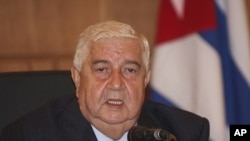Arab diplomats met Sunday with top Syrian officials in Doha, Qatar to try to de-escalate tensions between the Syrian government and the popular opposition as a bloody government crackdown draws more international condemnation.
Syrian government forces pursued their violent crackdown in and around the flashpoint cities of Homs and Hama, as Arab diplomats worked to stop the bloodshed during talks with a top Syrian envoy in Doha, Qatar.
Qatar's Foreign Minister Sheikh Hamad bin Jassim bin Jabor Al Thani met with Syrian Foreign Minister Walid al Muallem in a bid to put an end to the mounting spiral of bloodshed and violence. Al-Arabiya TV said Sheikh Hamad delivered an Arab League message “urging Syria to stop firing on unarmed civilians.”
The TV added Muallem complained the international community was over-reacting to “exaggerations and lies in the Arab media.”
It is not clear if any Syrian opposition leaders met with Muallem, but an opposition memo urged world leaders to “further isolate Syria, politically, diplomatically and economically.”
Joshua Landis, who heads the Center for Middle East Studies at the University of Oklahoma, believes the Arab League has sent a tough message to Assad that he must begin the process of stepping down or that more drastic measures will be taken. "I think this is a moment where the Arab League has probably laid down a fairly tough line and people are calling for Syria to be excluded. The Arab League has probably said 'you need to move forward and you need to start leaving power," he said.
Iran's Fars News Agency also reported that Iranian Foreign Minister Ali Akbar Salehi was visiting the Qatari capital to “meet senior Qatari officials” and to “exchange views over regional and international issues.” It is not clear if Salehi planned to meet with anyone from the Syrian opposition.
Earlier in an interview with Britain's Sunday Telegraph newspaper, Syrian President Bashar al Assad warned newspaper against Western intervention in his country's popular uprising, claiming it would “provoke an earthquake,” or an international crisis on a par with Afghanistan. Assad insisted Syria is able to deal with the crisis on its own.
He says that although the situation seems dangerous, Syria is able to deal with it and has started to make progress on the security front, recently. He argues that it is necessary to make progress in maintaining security, but that he is not worried about the situation.
Opposition demonstrators called on the West during protests Friday to impose a “no-fly zone,” over their country, like the one imposed on Libya last March. Until now, China and Russia have opposed UN Security Council draft resolutions that impose any harsh sanctions on Damascus.
But a Chinese envoy to the Middle East warned Sunday that the situation in Syria is critical and the government crackdown on its people “could not continue.” He urged the Assad government to hold talks with opponents, calling on Damascus to “show flexibility.”
Meanwhile, Syria's Prime Minister Adel Safar hosted a conference in Damascus on economic reform, which he called an “unstoppable process”:
He says that he considers reform all-encompassing process, including political, media, judicial, administrative and economic reforms. He adds that there is no turning back on economic reform.
Syrian government supporters also staged a rally in the mostly Druze southern mountain town of Sweda. Government TV showed large crowds of people chanting slogans in favor of President Assad and waving his picture.
Arab League Presses Syria to End Crackdown




